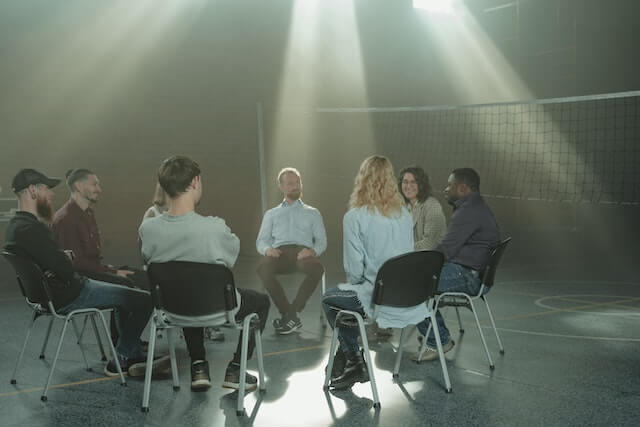While the experience of grief can be very isolating, we would like to help you take steps to counter the feelings of loneliness and disconnection. While the articles in our grief library can make a difference in your day-to-day life,
please don't hesitate to call us should you need additional support. We will do our best to ease your bereavement and, if requested, provide a referral to a local grief counselor or therapist.
When Grief Doesn't Ease
Sometimes it feels as if your bereavement will never end. You feel as if you’d give anything to have the pain go away; to have the long lonely hours between nightfall and dawn pass without heartache. You are not the only grieving person who has longed for some measure of relief.
In the novel, My Sister’s Keeper, author Jodi Picoult wrote, “There should be a statute of limitations on grief. A rule book that says it is all right to wake up crying, but only for a month. That after 42 days you will no longer turn with your heart racing, certain you have heard her call out your name.”
No such rule book exists. Grief counselors and therapists tell us that the length of time it takes anyone to grieve the loss of someone they held dear to them is dependent on the situation, how attached you were to the deceased, how they died, your age and gender. So many variables exist and there’s absolutely no way to predict how long it will take for you to adapt to your loss.
The Difference Between Normal and Complicated Grief
Research findings have led experts to come up with many differing categories of grief experience ranging from normal to complicated. Normal (or uncomplicated) grief has no timeline and encompasses a range of feelings and behaviors common after loss such as bodily distress, guilt, hostility, preoccupation with the image of the deceased, and the inability to function as one had before the loss. All are normal and present us with profound, and seemingly endless, challenges. Yet, Katherine Walsh says, “Over the course of time, with average social support…most individuals will gradually experience a diminishment of these feelings, behaviors, and sensations.”
So, how can you know if your bereavement is no longer within the range of normal? Ms. Walsh goes on to say, “While there is no definitive time period by which this happens, if an individual or members of a family continue to experience distress intensely or for a prolonged period—or even unexpectedly years after a loss—they may benefit from treatment for complicated grief.”
A Useful Model for Assessment: Worden’s Four Tasks of Mourning
There are certain tasks that, when achieved during your bereavement, can successfully allow you to emerge on the other side of loss as a better, stronger, and more resilient individual. James Worden proposed these four tasks:
- To accept the reality of the loss
- To process the pain of grief
- To adjust to a world without the deceased
- To find an enduring connection with the deceased in the midst of embarking on a new life
Instead of focusing on your bodily discomforts, feelings, and common behaviors, this model allows you to better see where you may be stuck or stalled in the adaptive process. Fortunately, Worden also gives us a list of indicators advising that "any one of these clues in and of itself may not be sufficient" for a diagnosis of complicated grief. "However," he continues, "any of these…should be taken seriously, and the diagnosis of complicated grief should be considered when they appear."
12 Clues... 12 Insights
While grief educators and theorists tell us that a diagnosis of complicated grief should not even be attempted until after the first anniversary of the death, if any one of the following symptomatic clues exists for longer than six months, you may want to consider grief counseling or grief therapy:
- You cannot speak of the deceased without experiencing intense and fresh grief long after the loss.
- A relatively minor event triggers an intense grief reaction.
- Your conversations with others are littered with references to loss. In other words, loss is an ever-present motif in your world view.
- You have issues related to your loved one's possessions. Keeping everything the same as before their death could indicate trouble just as tossing out everything right away can also be a clue to disordered mourning. (You also need to factor in your cultural and religious background)
- You have developed physical symptoms similar to those of the deceased before their death. Sometimes these symptoms recur annually, on the anniversary of the death, or on holidays. An increased susceptibility to illness or the development of a chronic physical complaint can also be an indicator.
- If you have made radical changes to your lifestyle, or excluded friends, family members, or even activities associated with the deceased, it may indicate unresolved grief.
- A long history of depression, often marked by guilt or low self-esteem, can reveal disordered mourning. The opposite is also true: a person experiencing a false sense of happiness or elation could be experiencing unresolved grief.
- A compulsion to imitate the deceased, in personality or behavior, can be a sign of complicated mourning.
- Having self-destructive impulses or exhibiting self-destructive behaviors can be significant. These can range from substance abuse, engaging in self-harm, developing eating disorders and suicidal tendencies.
- A sense of unexplained sadness occurring at a certain time each year (holidays, anniversaries, or birthdays) can also be a clue to unresolved grief.
- Developing a strong fear about dying, especially when it relates to the illness that took the life of your loved one, is an important clue.
- If you have avoided visiting your loved one's grave or if you are still unwilling to discuss the circumstances of their death, this could indicate complications in your bereavement.
There are many types of complicated grief; it can be delayed, masked, exaggerated, or chronic. Self-diagnosis is without purpose. A year after the death, if you feel your grief symptoms worsening, we advise that you seek a referral from your family physician for professional grief counseling or therapy.
Sources:
- Walsh, Katherine, Grief and Loss: Theories and Skills for the Helping Professions, 2nd Edition, 2012
- Worden, James, Grief Counseling & Grief Therapy: A Handbook for the Mental Health Practitioner, 4th Edition, 2009
When Grief is Unacknowledged
In Disenfranchised Grief: New Directions, Challenges, and Strategies for Practice, Kenneth Doka offered a very simple definition of disenfranchised grief as an experience when "survivors are not accorded a right to grieve". Can others really deny us our right to feel sorrow and pain? Can they set limits on our bereavement? The answer is, at least in some cases, yes. It happens all the time.
In Disenfranchised Grief Revisited: Discounting Hope and Love, Dr. Thomas Attig claimed this right entitles a bereaved person to grieve when he or she needs or chooses to, and in the manner in which they choose. In response, others are obligated to honor the right and refrain from interfering in the experiences and efforts of grieving.
It's more than "a matter of indifference to the experiences and efforts of the bereaved. It is more actively negative and destructive as it involves denial of entitlement, interference, and even imposition of sanction. Disenfranchising messages actively discount, dismiss, disapprove, discourage, invalidate, and delegitimize the experiences and efforts of grieving. In this way, the people around the bereaved withhold permission, disallowing, constraining, hindering, and even prohibiting the survivor's mourning.”
When Can Disenfranchised Grief Occur?
Author Jonathan Vatner shares examples of situations where disenfranchised grief can result:
- Your ex-husband passes away, for example, and your friends don't see why it matters.
- An executive is having a serious affair with her married co-worker. When he dies unexpectedly, the expression of her grief is limited by the covert nature of the relationship.
- A spouse, brother, or son is missing in military action.
- When death has occurred due to socially unacceptable causes such as AIDS or suicide.
- A beloved dog, cat or other pet has died.
What Does Disenfranchised Grief Sound Like?
When you are mourning an unrecognized or undervalued loss, you may hear statements like this:
- "When things like this happen, all you can do is give it time and wait it out."
- "Eventually, you’ll get over this."
- "The best thing is to try to put what happened behind you and get back to normal as soon as possible. Try to go on as if nothing has changed."
- "There’s no point in looking for meaning in something like this. Suffering brings us face to face with absurdity. The best thing is to try to forget."
- "Face reality. She is dead. You will have to fill her place with something else."
Sometimes those dealing with grief disenfranchise their own grief with inner talk that sounds like this:
- "Somehow it feels disloyal to laugh or try to be happy. I sometimes feel that I owe it to him to live in sorrow."
- "What can I possibly have to look forward to?"
- "I’m kind of embarrassed to admit that in some ways I seem to have grown from the death of my child."
- "How can I ever let myself love again if it all comes to this?"
Suffer in Silence No More
The stress of grieving in isolation can be unbearable. If we listen to Dr. Lani Leary, even if you endure the ups-and-downs of bereavement on your own, the grief work you do will still be compromised. She tells us that it is not time that heals. Instead, healing comes with validation: "All grief needs to be blessed. In order to be blessed, it must be heard. Someone must be present, someone who is willing to hold it by listening without judgment or comparison."
In the article "Mourning Becomes Neglected: 4 Healthy Ways to Grieve", author Jonathan Vatner shares these four ways you can reclaim your right to grieve and get much-needed support:
- Recognize that there is nothing wrong with you. Whatever your feelings are, they're legitimate.
- Find people who will understand. Search online—there are bereavement support groups for just about any type of loss.
- Be honest about how you feel. If a well-meaning friend cracks a joke about your deceased ex-husband, explain that this loss is painful for you.
- Develop a ritual or ceremony to commemorate the person's passing. Visit the grave after the funeral or hold a private one when you can take as much time as you need to express your anguish.
Speak Up and Speak Out
In the book Invisible Monsters, author Chuck Palahniuk wrote, “Most times, it's just a lot easier not to let the world know what's wrong.” Whatever you do, if you feel those around you are not supportive of your bereavement, do not follow his words. Let others know how you feel and what you're thinking. In doing so, you're educating them on the essential truth of bereavement: all losses are worthy of recognition and acknowledgement, and all those in mourning have the right to grieve.
Sources:
- Doka, Kenneith, Disenfranchised Grief: New Directions, Challenges, and Strategies for Practice
- Attig, Thomas, Ph.D, "Disenfranchised Grief Revisited: Discounting Hope and Love"
- Vatner, Jonathan, "Mourning Becomes Neglected: 4 Healthy Ways to Grieve"
- Leary, Lani, Ph.D., "No One Has to Grieve Alone: Validation is the Key to Resolving Grief", 2012.
- Palahniuk, Chuck, Invisible Monsters

